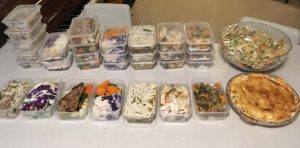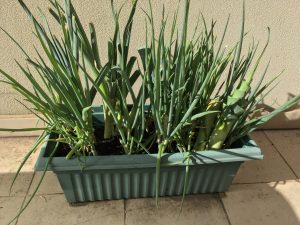Explaining my combination of intolerances is always difficult, and I usually find it easier to provide people with a list of foods I can eat. It is particularly difficult for those foods whose chemical content depends on how they have been treated (How old is the meat? Were there antioxidants in the oil used to fry the chips? Were the chickpeas tinned and how well were they rinsed? Did you thickly peel the potatoes? etc.) The other thing is low *insert chemical* doesn’t mean no *insert chemical* and it’s all about the threshold, which can be different for different people. For people who are familiar with peanut allergies or dairy intolerance, it is confusing to have a diet where there are not just allowed and forbidden foods. The questions above do matter and it can be hard for people to understand that whether you will react will depend on what else is in the meal and what you have eaten in the last week, days, or three hours. It’s also hard for them to understand that the reaction can be delayed.
It can be hard to trust others to cook safely for us. Once I said I could have a small amount of tinned rinsed chickpeas and ended up with the equivalent of half a can in a salad (high FODMAP). Another time I said I could have peeled carrot and cucumber (moderate salicylate), as long as there wasn’t too much and I ended up with the equivalent of 4 carrots and 2 cucumbers on a plate but with little bits of dark green peel left (definitely high salicylate). Someone bought plain salt chips for me but it was one of the brands that has unlisted antioxidants (under the 5% rule) and I only realised after sneaking in the kitchen and looking at the packet in the rubbish bin. I’m so grateful to people for trying, but sometimes I think it hurts them even more to have to turn down the food they have or bought made especially for you.
To be perfectly honest, I usually don’t trust people to cook safely for me unless I am supervising or they have experience in low salicylate/failsafe cooking and have consulted me. Instead I bring my own frozen meals if I go out or away. A bit of preparation before, a small esky and asking about microwaves/freezers ahead of time can really help. In January I cooked 34 meals in one day (see photo) and froze them all so that I would be able to attend a choir festival for two weeks without having to cook. It can help to bring a small container of instant decaf coffee on a plane flight or a bottle of maple syrup and citric acid to a family friends’ house so you can take part in the tea/coffee ritual. If I don’t have time to prepare but have space, I will put a whole packet of sakatas, a packet of rice thins, a jar of cashew paste, a jar of rice malt syrup and a knife in a green bag. Then I can prepare snacks as required and am much more self-sufficient. If I’m going away for longer I can add my cereal boxes, psyllium husk container, container of sugar and litre or two of SoGood soymilk.

A word of warning that shopping at the beginning, and whenever you are looking for a new product can be a draining experience – best done when you are not under time pressure or hungry. Shopping with a list in a familiar shop, and putting the hard to find items (choko, mung bean sprouts, rice crumbs) into an ‘if available’ list can reduce the stress, and likelihood of you wandering the aisles searching and mourning the foods you used to enjoy.

